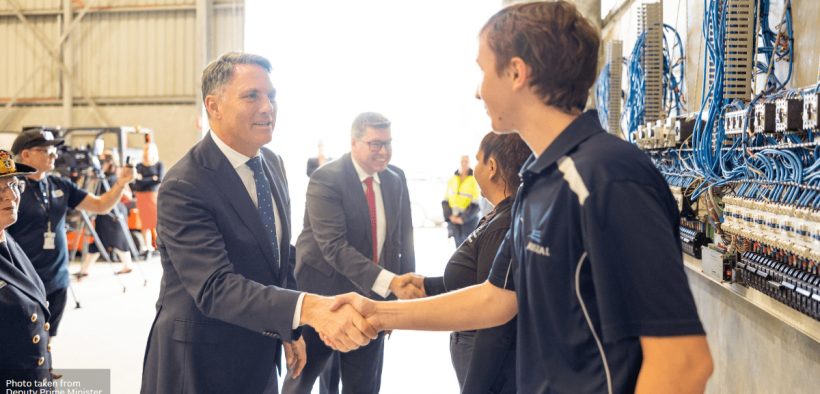The Federal Government has earmarked nearly $150 million to address the skills and workforce requirements crucial for Australia’s nuclear-powered submarine program under the AUKUS alliance.
The AUKUS plan, which involves the acquisition and domestic manufacturing of nuclear-powered submarines, is projected to generate approximately 20,000 direct job opportunities over the next 30 years across various sectors.
“The Albanese Government understands that front and centre of the success of Australia’s nuclear-powered submarines will be the many thousands of Australians who help build them,” Deputy Prime Minister Richard Marles said.
“We need to start investing in those skills now- this is a project which starts this year and will span decades with enormous opportunities.”
One of the primary challenges currently faced by Australia’s nuclear-powered submarine program is the development of a skilled workforce capable of constructing this sovereign capability within the country.
To address this, the government has reaffirmed its commitment to providing the necessary training and expertise for a home-grown workforce capable of building and maintaining Australian nuclear-powered submarines.
“The AUKUS submarine program will be the most transformative industrial endeavour in Australian history,” Minister for Defence Industry Pat Conroy said.
“Young Australians starting training now have a bright future ahead of them with secure high skilled, well-paid jobs that will make an important contribution to Australia’s defence industry and our national security.”
Commencing this year, the comprehensive AUKUS skills and training package is said to include $128.5 million over four years to support an additional 4,000 university placements and provide funding for the Department of Education.
These positions will be targeted at STEM disciplines encompassing physics, chemistry, mathematics, materials science, naval architecture, computer science, as well as mechanical, electrical, chemical, and nuclear engineering.
“These extra 4,000 places are in addition to the existing 20,000 more Commonwealth Supported Places already funded by the Australian Government to address skills shortages in areas of national priority,” Minister for Education Jason Clare said.
“This funding commitment will ensure more Australians have the opportunity to go to uni and develop the advance technical skills needed to work on these nation-changing projects.”
The package also includes $3.9 million over two years to establish a skills taskforce within the Department of Employment and Workplace Relations. This taskforce will collaborate with industry leaders, tertiary education institutions, labor unions, state and territory governments, and various Commonwealth bodies to strategize and build the skilled workforce required for Australia’s future.
“This taskforce will play a vital role in advising how the vocational skills and training sector can be geared up to support this new workforce,” Minister for Skills and Training Brendan O’Connor said.
“It’s important we work in lock-step with industry, tertiary education sector leaders, unions, State and Territory Governments to plan and build the skilled workforce needed for Australia’s future.”
$11.4 million will also be provided over three years to extend the Defence Industry Pathways Program within the Western Australian shipbuilding sector, sustaining a steady pipeline of skills and talent into the defense shipbuilding industry.
The government has also announced plans to collaborate with the South Australian Government in establishing a Skills and Training Academy as part of the AUKUS Submarine Workforce and Industry Strategy. This Academy will offer specialized education, training, and skill development programs for the submarine and naval shipbuilding workforce.
Recognizing the importance of skilled personnel, the government aims to strengthen Australia’s sovereign industry capabilities and successfully deliver the transformative nuclear-powered submarine program.
This investment signifies a step towards fulfilling AUKUS commitments and bolstering national security.
Eliza is a content producer and editor at Public Spectrum. She is an experienced writer on topics related to the government and to the public, as well as stories that uplift and improve the community.


























































